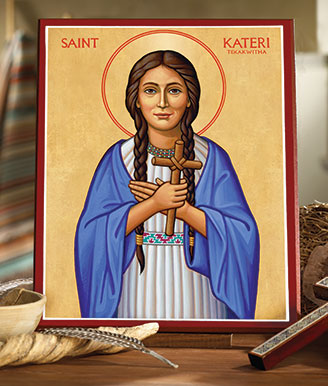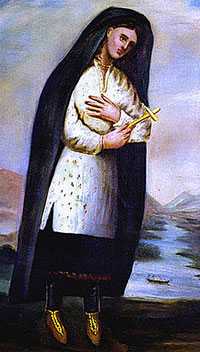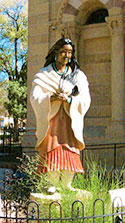
Beatified by Pope John Paul II in 1980, Kateri Tekakwitha was canonized by Pope Benedict XVI in October 2012. An image of purity, courage, and prayer, she is the first Native American woman to be canonized by the Catholic Church.
Daughter of a Mohawk chief and an Alongquin Indian woman who had converted to Catholicism, Saint Kateri was born in in present-day New York in 1656. A smallpox epidemic in 1661-1663 left her an orphan, with a badly scarred face and impaired eyesight. Because of her poor vision, Saint Kateri was named "Tekakwitha," which means "she who bumps into things."
She was taken in by her uncle, who was bitterly opposed to Christianity. As a young girl, in accordance with Iroquois custom her foster family paired her with a young boy who they expected she would marry. However, Saint Kateri chose to dedicate her life to God.

The only known portrait from life of St. Kateri Tekakwitha, painted by Father Claude Chauchetière in 1696.
When she was 18 she began instructions in the Catholic Faith in secret, having coming into contact with the Jesuit missionaries that frequented Mohawk villages after the French forces defeated the Mohawks. Her uncle finally relented and gave his consent for her to become a Christian, provided that she did not try to leave the Indian village. For joining the Catholic Church, the young girl was subjected to accusations of sorcery and promiscuity, and ridiculed and scorned by villagers who even threatened her life.
Taking the name Kateri (Catherine) at baptism, two years later she escaped to the Mission of St. Francis Xavier, a settlement of Christian Indians in Canada. The village in Canada was also named Caughnawaga and called "the village of the praying Indians." Here she was known for her gentleness, kindness, and good humor. On Christmas Day 1677 Saint Kateri made her first holy communion and on the Feast of the Annunciation in 1679 made a vow of perpetual virginity. She also offered herself to the Virgin Mary, asking Our Lady to accept her as a daughter.
Most of these early Indian converts were women, devoted to the Christian ideals of charity and asceticism. When they learned of nuns and convents, many wanted to form their own and created an an informal association of devout women. Saint Kateri taught prayers to children and worked with the elderly and sick. She would often go to Mass both at dawn and sunset and was known for her great devotion to the Blessed Sacrament and to the Cross of Christ. A Jesuit priest quoted Saint Kateri as saying: "For a long time my decision on what I will do has been made. I have consecrated myself entirely to Jesus, son of Mary. I have chosen Him for my husband and He alone will take me for wife."
Another Jesuit priest wrote in his biography of Saint Kateri as a model of "charity, industry, purity and fortitude."
During the last years of her life, she endured great suffering from tuberculosis. She died on April 17th, 1680, shortly before her 24th birthday, and was buried in Kahnawake, Quebec, Canada. Her final words were "Jesus — Mary — I love you."
The Jesuit priest Fr. Cholenec later wrote: "This face, so marked and swarthy, suddenly changed about a quarter of an hour after her death, and became in a moment so beautiful and so white that I observed it immediately."

Statue of Saint Kateri outside the SainFt rancis Cathedral Basilica in Santa Fe, New Mexico
Before her death, Saint Kateri promised her friends that she would continue to love and pray for them in heaven. Both Native Americans and settlers immediately began praying for her heavenly intercession. Several people, including a priest who attended her during her last illness, reported that the saint had appeared to them and many healing miracles were attributed to her. Fifty years after Saint Kateri's death the first convent for Indian nuns was established in Mexico and they pray daily for Blessed Kateri's canonization.
She is venerated as the Protectress of Canada and the patron saint of Native Americans and ecology.